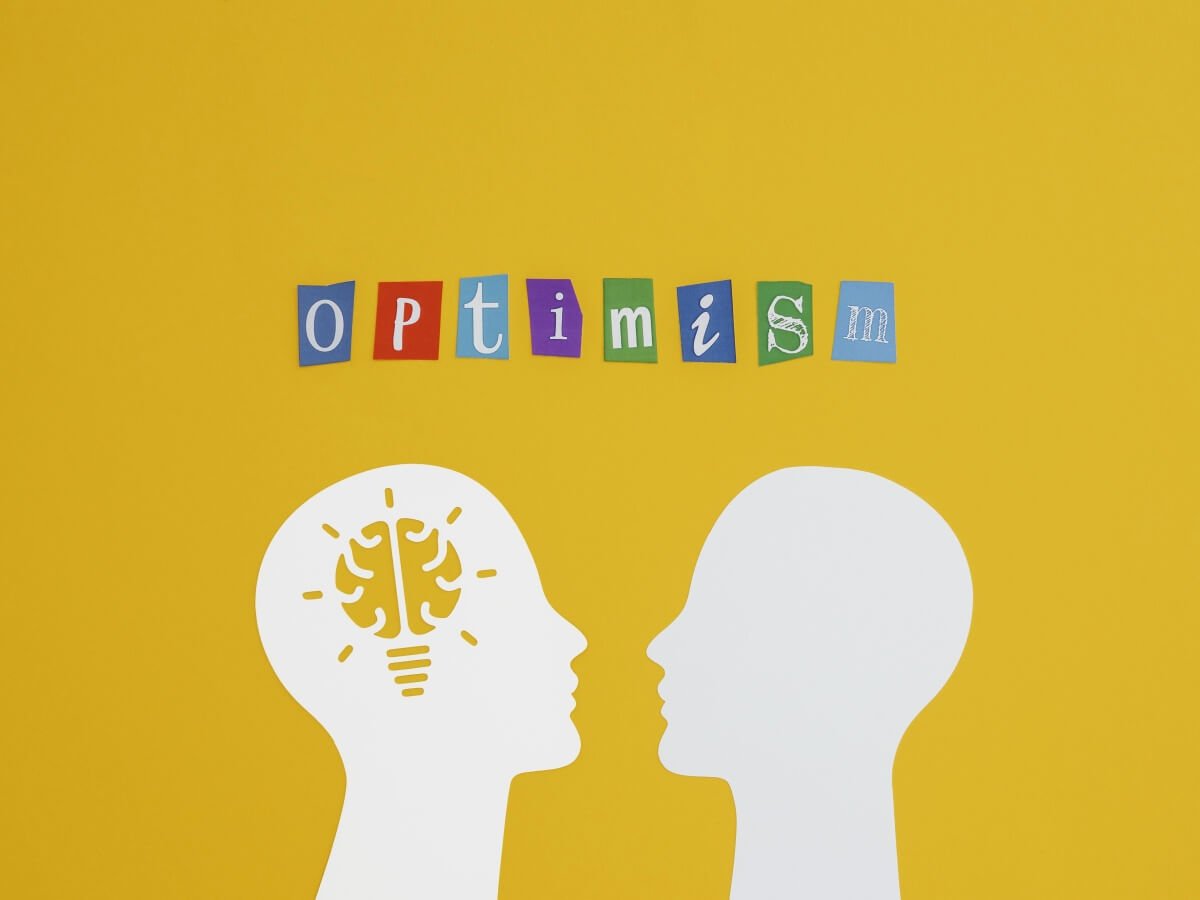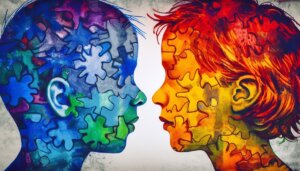Table of Contents
Emotional Intelligence in Personal Growth

Self-Perception and Self-Regulation
Emotional intelligence in relationships plays a crucial role in our personal and professional success and well-being. Core skills of emotional intelligence include self-awareness and self-regulation. These are particularly important in romantic relationships and within the framework of Emotional Intelligence Partnership.
Self-Awareness: The Key to Deeper Emotional Understanding
Self-awareness means recognizing and understanding your own emotions. This ability enables you to identify signals in your body and interpret them correctly. For example, imagine your partner makes a criticism and your heartbeat accelerates, your palms become sweaty. These are signs of stress or anxiety. Through self-awareness, you can identify these signs of your feelings and act accordingly, instead of reacting impulsively.
- By recognizing your own reaction in emotionally charged moments, you can better handle the situation and thus improve the quality of your romantic relationship.
- In moments of anger or disappointment, self-awareness allows you to step back and analyze the cause of your emotions before saying or doing something that could damage your relationship.
- Another aspect of self-awareness is recognizing patterns in your own behavior, which may be shaped by past experiences. Understanding these patterns can help shape future relationships positively.
Self-Regulation: Effective Management of Your Own Emotions
Once you recognize your emotions, it is equally important to regulate them appropriately. Emotional self-regulation includes strategies for handling your feelings without being dominated by them. Personal relationships benefit greatly when both partners are able to keep their emotions in check.
In conflict situations, this is particularly important. For example, if you feel anger rising, use techniques such as deep breathing or a short walk to calm yourself. This allows you to communicate constructively and not hurtfully.
- Emotional intelligence and romance also involve choosing the right moment for difficult conversations.
- Another element of self-regulation is setting long-term goals instead of opting for short-term emotional gratification, which is extremely valuable in a partnership.
- Through self-regulation, you can also maintain a positive mood in your relationship, even when external life brings stress and challenges.
In emotional intelligence in relationships, self-awareness and self-regulation are therefore fundamental pillars. They help foster a stable, empathetic, and loving partnership where both partners are capable of understanding and managing their emotions. Applying these skills in everyday life can strengthen the bond between you and your partner and enable a more fulfilled love life.
Motivation and Empathy
Emotional Intelligence (EI) is the invisible bond that shapes the success of our social interactions and is particularly indispensable in our closest relationships. It’s the skills we employ in emotional intelligence in relationships that allow us to identify, understand, and regulate emotions in ourselves and others. This article highlights how EI strengthens our motivation and fosters empathy, shedding light on its positive impact in both personal and professional environments.
The Driving Force of Inner Motivation
Empathy is the ability to recognize and understand the feelings of others, and is a core component of EI. By understanding the emotions of our counterparts, we can communicate more effectively and build relationships on a deeper level. Both in romantic relationships and in general emotional intelligence partnerships, empathy is a bridge to connection and mutual respect.
In the professional world, the role of EI in motivation becomes clear. Managers who exhibit high emotional intelligence are often able to better understand and motivate their employees. They recognize stress signals early and can act before work morale and productivity suffer.
A practical example of this is the situation in a project team: If a member faces private challenges, an emotionally intelligent leader will notice this. Instead of exerting pressure, they will offer support and possibly adjust the workloads temporarily, thereby not only strengthening the morale of the individual but also that of the entire team.
Emotional Intelligence and Romance
In Romantic Emotional Intelligence, understanding the perspective of the partner plays a crucial role. Couples who understand each other emotionally and cater to the needs of the other experience deeper satisfaction in their relationship. The willingness to empathize and respect each other’s needs contributes to a stable and loving partnership.
For instance, in times of crisis, the importance of emotional intelligence becomes evident. If a partner is struggling with professional stress, the emotionally intelligent partner can sense this and provide suitable measures for relief and support by temporarily sacrificing their own needs and instead creating space for conversations and recovery.
The skills of Emotional Intelligence are not innate, but can be learned and perfected. Through attention, reflection, and practicing empathetic behavior, they can be integrated into everyday life. This leads to a more fulfilled professional and personal life and helps master interpersonal challenges. Thus, EI acts like oil in the machinery of our relationships – it keeps the parts moving and ensures everything runs smoothly.
Emotional Intelligence in Romantic Partnerships

Communication and Conflict Resolution
Emotional intelligence and romance are closely intertwined aspects that establish the foundation for a stable and satisfying partnership. The ability to understand and manage one’s own and others’ emotions plays a central role in communication and conflict resolution in personal relationships.
Use of Emotional Intelligence in Communication
Effective communication is the backbone of any relationship. In the field of emotional intelligence in relationships, it is emphasized how important it is to clearly express one’s own emotional experiences and recognize and respect the feelings of the other. Emotional self-awareness allows, for example, detecting mood swings before they escalate into an argument. Partners who possess this self-insight can communicate proactively why they feel a certain way, rather than reverting to defensive or aggressive behavior.
Constructive Conflict Resolution through Emotional Intelligence
In the dynamic world of romantic relationships, disagreements are inevitable. Emotional intelligence in partnerships opens the door to deeper problem solving by encouraging us to act empathically. A high degree of empathy helps couples to put themselves in the other’s shoes during disputes and to identify the core of the conflict. Through the practice of empathy and understanding, the search for solutions will be less dominated by accusations and more by a pursuit of common goals.
These concepts are best illustrated through real examples. Imagine a couple where one partner feels neglected because the other spends too much time at work. Here, emotional intelligence can help to communicate feelings without blame and find solutions without ignoring the other’s professional demands. The partners could make agreements that consider both career desires and the need for shared time.
- The application of active listening also counts among the essential techniques promoted by emotional intelligence.
- Emotion regulation helps to not react impulsively and instead reflect on what has been said.
- Social competence involves proposing appropriate compromises that are perceived as fair by both partners.
Thus, emotional intelligence in personal relationships is a key tool that enables couples to face challenges together and sustainably strengthen the quality of their relationship. It teaches us that conflicts do not necessarily have to lead to breakups but can also serve as an opportunity to deepen and improve the relationship.
Relationship Building and Maintenance
Emotional intelligence is the key to profound and fulfilling relationships. It plays a central role especially in partnerships, as the ability to recognize, understand, and appropriately respond to emotions in oneself and one’s partner strengthens mutual understanding and trust. This, in turn, forms the foundation for a lasting bond.
The Connection between Emotional Intelligence and Romance
The integration of emotional intelligence in relationships often starts with small gestures and moments of attention. Partners who are aware of their own feelings and those of the other can create intimate moments that deepen their connection. Romantic emotional intelligence manifests itself, for example, in noticing stress signals from the partner and responding with care rather than indifference or criticism.
- A couple faces a challenging life situation. With emotional intelligence, both partners can talk openly about it, support each other, and find a solution together, instead of withdrawing or losing themselves in arguments.
- Romantic surprises and expressions of affection based on the emotional needs of the partner, not just personal preferences, strengthen personal relationships.
- Emotional intelligence also enables communication on an equal footing in heated discussions, which promotes understanding and prevents injuries.
Creating Closeness and Building Trust
In practice, emotional intelligence in partnerships means a deep understanding of the thoughts and feelings of the other. When a person senses that their feelings are perceived and valued, they are more likely to open up and share more of their inner self. This creates the basis for true closeness.
Let’s take a concrete example: One partner comes home frustrated from work. The other recognizes the emotional state and offers support, perhaps by listening or preparing the favorite meal. Such a gesture can enhance a feeling of security and trust, which enriches the relationship substantially.
Strengthening Long-Term Bonds
The ability to combine emotional intelligence and romance is crucial for long-term happiness in a relationship. It’s about more than just understanding emotions in the moment – it’s about the ability to grow with life’s changes. Partners who act with emotional intelligence can encourage each other to discover new things and develop as individuals while staying together as a couple.
A practical example of this would be a couple deciding to take a dance class together to expand their shared range of experiences and bring new momentum to the relationship. Here, it is essential to be open to feedback and grow together through challenges.
In conclusion, emotional intelligence in relationships not only lays the foundation for a happy partnership but also holds the key to a lasting deep connection. It enables couples to grow together, adapt, and lead an intense, understanding- and trust-filled relationship that can stand the test of time.
Summary
Emotional intelligence in relationships is an essential building block for interpersonal success and our general well-being. It significantly influences how we shape and maintain our personal and professional relationships. Core skills such as self-awareness and self-regulation are particularly crucial in romantic relationships and within the framework of Emotional Intelligence Partnership, contributing significantly to a more fulfilling love life.
Key Skills for Successful Interactions
The ability of self-awareness allows us to perceive and accurately interpret our own emotions. This can be invaluable in emotionally charged moments. Whether in conflicts or when planning the future together, self-awareness helps us control our impulses and make considered decisions.
- Through self-awareness, we can recognize stress signals during criticism and respond constructively.
- This ability allows us to pause and act reflectively in moments of anger or disappointment.
- Behavioral patterns can be identified through this self-knowledge and used for positive changes.
Self-regulation represents the responsible handling of one’s own emotions. Good management of our emotional world helps us keep a cool head even in tough situations.
- Emotional intelligence enhances the timing for sensitive conversations in a partnership.
- Long-term goal setting rather than short-term emotional gratification strengthens the quality of the relationship.
- Positive mood management is crucial in challenging times for the relationship.
Emotional intelligence and romance are closely linked. Empathy, the ability to understand the emotions of others, is a vital part of it. In professional contexts, a high degree of EI improves the ability of leaders to motivate their employees and create a healthy work climate.
The Art of Communication and Conflict Resolution
In communication, emotional intelligence plays a supporting role. The ability to express one’s own emotions and respect those of the partner is the cornerstone of healthy relationships. Conflict resolution through EI requires us to consider the perspective of the other and reach an understanding of the common goals.
- Active listening is promoted by EI and is indispensable in communication.
- Regulation of one’s own emotions prevents impulsive reactions and promotes thoughtful action.
- Social competence within the scope of EI involves developing appropriate compromises.
Ultimately, Romantic Emotional Intelligence allows us to build intimate and long-term relationships through connectedness and trust. The willingness to support the partner and value their emotions fosters closeness and mutual growth. Emotional intelligence is the lubricant of our relationships – it ensures that the wheels of our personal connections run smoothly and our bonds are deep and fulfilling.
FAQ – Emotional Intelligence in Relationships
How can emotional intelligence resolve conflicts in personal and romantic relationships?
Emotional intelligence enables us to perceive, understand, and empathically respond to the feelings of others, which forms the basis for constructive conflict resolution in personal and romantic relationships. By learning to manage our own emotions, we can communicate calmly and clearly, which reduces misunderstandings and allows us to find compromises. Thus, conflicts no longer become insurmountable obstacles but paths on which we can develop mutual understanding and deeper connections.
How can emotional intelligence help resolve conflicts in personal and romantic relationships?
Emotional intelligence enables us in conflict situations to recognize and understand our own feelings and those of our counterpart, which results in us responding more empathetically and more easily adopting the other’s perspective. Through the conscious handling of emotions, constructive communication is promoted, allowing couples to reduce tensions and look for solutions together that are satisfactory for both sides. By learning to pay attention to our emotional response and expressing it appropriately, the relationship can be strengthened and trust deepened among each other.
How does emotional intelligence affect conflict resolution in personal and romantic relationships?
Emotional intelligence plays a crucial role in conflict resolution in personal and romantic relationships, as it enables individuals to better understand and manage their own emotions and those of their counterparts. People with high emotional intelligence can communicate more effectively, show empathy, and thus clarify misunderstandings and reduce tensions. They tend to seek constructive solutions that consider the needs and emotions of all involved, leading to stronger and more satisfying relationships.








